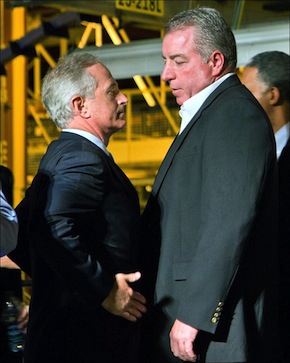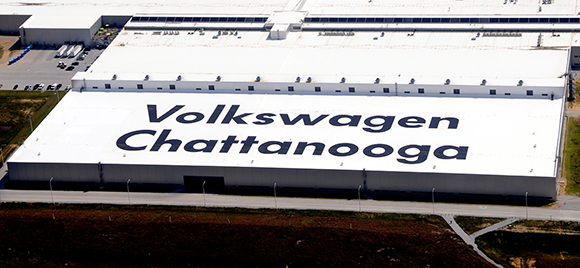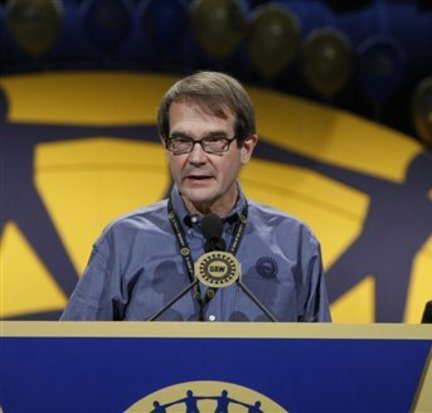by Steve Early
February 22, 2014
Most progressive media commentary on the United Auto Workers’ defeat last week in a key Volkswagen (VW) plant election has focused, understandably, on the role of outside union-bashers, the anti-union culture of the south, or the unfavorable racial composition of the company’s Chattanooga, TN workforce. (See, for example, here or here.)
Pursuant to negotiations with the UAW and its German union ally, IG Metall, Volkswagen agreed not to campaign against unionization in a blue-collar unit of 1,500. UAW organizers got highly unusual access to the plant to make their case at several hour-long shift meetings and in any one-on-one conversations that VW employees wanted to initiate in a specially designated room or other non-work areas just prior to the vote. The only limit on UAW communication was a legal pledge not to visit employees, uninvited, at home, and to keep any written comments about the company “positive” and “non-adversarial.”

Bob Corker (left) with a UAW official in 2011.
So the usual management task of going negative—to scare workers into voting “No”–was undertaken with typical conservative gusto by influential state legislators, the governor of Tennessee, U.S. Senator Bob Corker, and other well-funded GOP helpers from out-of-state. Their compelling message was that a pro-union vote would deprive the plant of new work and/or continued public subsidies. President Obama weighed in tepidly and semi-privately on the union side; his intervention, per usual, was too little, too late.
Right-wing fear mongering became a successful surrogate for the coercive propaganda war normally waged by U.S. employers themselves when their employees petition for a Labor Board election. By a margin of 712 to 626, a three-year UAW drive to help Chattanooga workers win bargaining rights (and a German-style “works council”) was defeated. The outcome will make union recruitment harder at other strategic southern auto plants, operated by foreign manufacturers like Daimler and Nissan, where similar UAW drives are underway.
Co-Determination Derailed
In less noted fashion, the VW election results also have daunting implications for labor’s broader strategy of “bargaining to organize.” In Chattanooga, this once promising but now increasingly troubled approach was backed by a big union abroad–in a crucial expression of cross-border solidarity aimed at protecting workers rights via private agreement about organizing ground-rules in the U.S.
In multiple industry settings—auto, telecom, trucking, healthcare, and hospitality– “bargaining to organize” has enabled tens of thousands of American workers to join unions without management harassment, threats, intimidation, or job discrimination. Workers get to demonstrate their support for bargaining rights in one of two ways, and sometimes both. Their union card signing majority can be verified by a neutral third party or, less preferably, confirmed in a secret ballot vote engineered, per labor-management agreement, to be “free and fair.” The key element either way is a negotiated pledge of employer neutrality. This, of course, is not binding on third parties in Tennessee or anywhere. Organizing rights deals can also unravel when companies who sign them (like Verizon Wireless or Yale New Haven Hospital) later flout their terms by engaging in anti-union activity or failing to rein in lower-level supervisors who do.
In Chattanooga, IG Metall pressured VW to respect workers’ rights in the same fashion required back home. In Germany, the 2.4 million-member IGM has heavy representation on VW’s supervisory board and dominates its elected “works councils” at every level of the company; plus there is plant-level worker representation in more than 100 VW locations worldwide. IGM and other VW unions have a major stake in ensuring that some mix of collective bargaining and German-style “works council” consultation with employees occurs everywhere, even in benighted nations like the U.S. and China.

As I recount in my new book, Save Our Unions, Germany’s largest service sector union, ver.di, has spent ten years trying to achieve more favorable organizing conditions for 25,000 workers at T-Mobile in the U.S. This German-owned wireless phone company is deeply hostile to the Communications Workers of America and almost entirely non-union here. To its credit, IG Metall actually succeeded in leveling the playing field for the UAW in Chattanooga, via its greater clout within VW. But the resulting organizing rights deal had problematic features, some of which drew attention to questionable bargaining practices of the petitioning union. Most critically, the VW-UAW agreement did not require the company to recognize the union as soon as it achieved a verifiable “card majority” last fall, giving anti-UAW forces, inside and outside the plant, ample time to turn that majority support into a minority vote by mid-February.
Cooperation Promised
In concert with IGM’s considerable outside leverage, the UAW conducted its own distinctive charm offensive aimed at winning over VW management. While the UAW did recruit an “in-plant committee” and sign up supporters in traditional union fashion, UAW officials tried to assure Volkswagen that their organization was a different kind of American union.
To demonstrate it would be a suitably pacific, the UAW disclaimed, in writing, any intention to strike or picket for a first contract in Chattanooga. As In These Times correspondent Mike Elk reported, the union also committed itself to “maintaining and where possible enhancing the cost advantages and other competitive advantages that [Volkswagen] enjoys relative to its competitors in the United States”—a reference to the UAW-represented “legacy automobile manufacturers” in Detroit, who have been past beneficiaries of many controversial union give-backs.
As an additional friendly gesture, the UAW explicitly agreed to curtail what would be the normal scope of contract bargaining by a newly recognized union. If certified, the UAW pledged to support creation of an elected “works council” composed of both union-represented hourly workers and non-union salaried workers (some of whom campaigned vigorously against unionization). Under this “innovative model of labor relations,” the UAW promised to “delegate functions and responsibilities ordinarily belonging to a union” to the council so the latter could engage “in co-determination with the employer.”
Initially, “the Works Council would be expected to focus on …work organization, especially agreements on shift calendars and scheduling of overtime; ‘social issues,’ such as health and safety;” and “participation in the implementation of a grievance procedure” that would have, as its “shared objective,” the avoidance of “filing and processing formal grievances.” (For more details of this thwarted Tennessee engagement pact, see here and Elk’s related account here.)
The sad ending to labor’s latest experiment with being “non-adversarial” immediately brought to mind the famous comic strip, penned in the early 1980s, by Fred Wright, longtime cartoonist for Wright’s graphic parable about the manipulation of laborers, individually and organizationally, made sense to many left-leaning trade unionists thirty years ago. But a growing number of influential and otherwise progressive national union leaders, including current UAW president Bob King, rejected its simple message, as outdated and outmoded, like the tiny UE itself. In their view, union opposition to “cooperative labor relations” is counter-productive and self-defeating. Any such antique notions–rooted in “class struggle unionism,” as former SEIU President Andy Stern called it—must be abandoned, in order for unions to survive, much less revive, in a hostile 21st century environment. One manifestation of this creative “new thinking” was “the high road” to union growth championed by Stern and Boston-based academics like Tom Kochan and Barry Bluestone. (The latter is the son of Irving Bluestone, the late UAW Vice-President who pioneered “quality of work-life” programs with General Motors in the 1970s.) Under Stern, SEIU began to pursue a health care industry growth strategy based on fostering “cooperative rather than confrontational relationships” with hospital chains like Kaiser and nursing home operators in need of union lobbying help for higher Medicaid reimbursement rates. If unions could just demonstrate their “value added” to more private and public enterprises, management resistance to collective bargaining would melt away, Stern argued. Meanwhile, the result within SEIU was a huge membership backlash in California, against contract givebacks offered in return for organizing deals, negotiated after little or no consultation with negatively affected dues payers. Intra-union tension over such quid pro quos, and their resulting threat to existing contract standards, soon morphed into inter-union conflict with former SEIU allies like UNITE-HERE. In the manufacturing sector, no union has followed this “non-adversarial” playbook more closely than Bob King’s UAW, even when it led to undercutting of auto industry labor standards upheld by other unions like the Teamsters. (See here.) U.S. unions today really are caught between a rock and hard place, damned if they do, damned if they don’t. If they market themselves as a de facto doormat for management, they lose some rank-and-file votes doing that. If union members dare to struggle–resisting contract concessions and going on strike–their workplace militancy risks alienating other non-union workers, not to mention supplying management with an alternative rap about the downside of union membership. The results in Chattanooga are not much of a testimonial to the lap dog approach. Among the questionable provisions of the ill-fated UAW deal with VW is a promise by the union to “discontinue all organizing activities at the Chattanooga Plant,” in the event of an election loss, and “not engage in or resume any organizing” there “for a period of one year” from the date of its defeat. No anti-union consultant could have come up with more damaging verbiage, painting “the union” as a “third party” external to the workplace and divorced from the interests and needs of those employed there. Lets hope the UAW bounces back from its near miss last Friday by ignoring this employer-mandated withdrawal of organizational support for those VW workers brave enough to buck the Bob Corker crowd, now and in the future. As a longtime national organizer for the Communications Workers of America, Steve Early was involved in many campaigns for organizing rights and card check recognition. He is the author of several books about related organizing and bargaining controversies, including The Civil Wars in U.S. Labor (Haymarket Books, 2011) and Save Our Unions (Monthly Review Press, 2013). He can be reached at Lsupport@aol.com
UAW President Bob King.Will UAW Disappear?

Comments
One response to “VW to UAW: So Long Partner?”
Mr. Early’s article just barely scratches the surface of the vast class-collaborationist FAIL that the UAW brought upon itself in their attempt to “organize” a de-facto company union for Volkswagen. The AFL-CIO’s longstanding support for the capitalist system is behind this utter failure to inspire workers in the United States with the basic economic self-defense concept of trade unionism. The UAW has placed itself so nakedly in the missionary position on the “negotiating table” (more like a king-sized bed in the executive suite) and begged the capitalist class to “be gentle with us” for so long that its becoming boring – even the capitalists don’t want to dally with these too-pliant union “negotiating partners” any more. The workers see absolutely no value in paying dues to an organization that hasn’t won a strike in their lifetimes and that is so closely aligned with the companies they “organize” that they appear to be nothing less than company finks in the union movement! And what about the close ties between the unions and the widely and justifiably HATED pro-capitalist, war, torture and US-citizen-assassinating DEMOCRATIC PARTY? Now THERE is the dead, rotten, stinking donkey carcass in the living room that no one on the “left” wants to talk about! DUMP THE DEMOCRATS AND BUILD A WORKERS PARTY! Not one single dollar of union dues should ever go to ANY pro-capitalist political party!
The AFL-CIO membership reached it’s peak around 1948 and has been in decline ever since the communists were driven out during the Mccarthy witch-hunts. The concepts of militant class struggle were then replaced with increasingly pro-capitalist ideologies tied more and more firmly to the wholly-owned sockpuppets of the capitalist class in the Democratic party. For the last 40 years – at least! – all the “leadership” of the AFL-CIO unions has done is to slowly bargain away all the gains that had been won by the workers in the bloody class warfare of the 1920s,’30s and ’40s. Now, there’s nothing left to give away, and so the “strategy” of these fake labor leaders has reached the bottom of the barrel. All they can think of is to move ever “closer! closer!” to the company bosses in order to “prove to them” that having a union will be “good for business”. If the UAW “leadership” got any “closer” to the capitalists, as Groucho Marx said, they would be in back of them! Class-collaborationism does not inspire confidence in the workers, who know down to their bones that anyone who tells them – as ALL the AFL-CIO “leaders” do – that “the interests of the company and the workers are identical” is a god-damned liar! THIS is why the UAW and the AFL-CIO can’t organize a lemonade stand! So long as these “labor lieutenants of capital” remain in their position as the lid on the pressure cooker of class struggle there will be no victories of any kind for the US union movement. Only a militant, class-struggle leadership of the unions – which necessarily means one that is led by revolutionary socialists who understand that the interests of the workers and the capitalists – and their cops – are diametrically opposed! – can organize the south – or the north or anywhere else on this planet.
The IG Metall union, like the UAW, is living on the victories that were won by the communist-led unions of Germany back in the period between WWI and WWII, which were reinstituted in the West in order to keep the West German workers from overthrowing the capitalist system after the Red Army kicked the crap out of Hitler’s Nazis. Like their class-collaborationist brethren in the US, IG Metall’s trumpeting of their worthless “control” of Works Councils – which are nothing more than a company-run mechanism to squeeze more profits out of the workers – proves that they, too are pro-capitalist sellouts of the first water. All the IG Metall union piecards “control” via the Works Councils is their you-know-what in their hands!
“Lets hope the UAW bounces back from its near miss”? Hell no! Let’s hope that the UAW membership wakes up and realizes that having a pro-capitalist “leadership” in the UAW is like having company-approved generals running a worker’s army! UAW members: Kick the company-loving, strike-avoiding, sellout, worthless, class-collaborationist “labor lieutenants of capital” OUT of your union leadership and replace them with a class-struggle leadership that utilizes the methods of class warfare perfected in the 1930s: the sit-down strike, occupying the factories and building picket lines that no one DARED to cross! When you do that, and the workers around the US see you winning strike after strike and fighting intransigently for the rights of the working class – instead of the “rights” of the capitalists to the profits they steal from you! – like in the 1930s, there will be a tidal wave of workers joining unions from coast-to-coast and line-to-line!
Workers of the World, Unite!
Independent Workers Party of Chicago